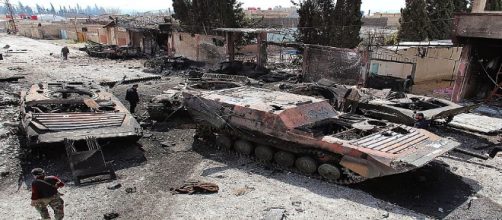ASSAD has been blamed for the chemical weapons attack in Douma, the US and the UK both categorically blamed the Russian backed Syrian government led by Bashar al-Assad. Jeremy Corbyn has called for caution before we decide to send the military into the region again, obviously, with the air of caution over the Iraq war in 2003, although, what is interesting is that unlike then, he is not definitively saying that this shouldn’t be an option.
With Iraq, Jeremy Corbyn led and spoke at the largest demonstration of all time over the Iraq war and he was proved right.
This time, however, he has been more cautious over definitively ruling military action out, the history allows us to understand why.
The Syria struggles
Assad took over a sectarian dynasty from his father and complex domestic and regional geopolitical considerations underpinned the establishment of his rule over a minority sect in the country. Syria's relations with Iran and Russia on the one hand, and Israel's existence as a useful excuse on the other, provided the Syrian regime with a special geopolitical backdrop. US-Iranian cooperation after the Invasion Of Iraq only solidified Syria's position. Arab uprisings that triggered revolts in Tunisia, Libya and Egypt began with the focus on economic grievances that were related to the destructive tendencies of the 20th-century status quo.
In Libya, Muammar Gaddafi was able to use military power to quell revolts but without a greater understanding at what he was fighting against, led the country to be plunged into civil war. But in Tunisia and Egypt, Zine El Abidine Ben Ali and Hosni Mubarak weren’t able to use military force owing to the geopolitical axis and institutionalised state structures. Furthermore, Syria was the missing piece within the Arab uprisings that erupted with incomparable bloody violence and it was in the early days that messages were written on walls by youths that stated: "The people want to topple the regime." Giving a political context and beginning the Syrian revolt.
With this in mind, we move onto the Hama rebellion in 1982, which saw the Muslim Brotherhood lead a major insurrection in Hama and take control of the region.
However, under orders from then-president Hafez al-Assad, the Syrian Arab Army and the Defense Companies, besieged the town of Hama and massacred around 1000 to 25,000 people, effectively ending a Sunni Muslim uprising that began back in 1976 and the Hama events marked the defeat of the Brotherhood, and the militant Islamic movement in general, as a political force in Syria.
This brings us back to Bashar al-Assad, who inherited his position off of his father, Hafez. For the last seven years since the 2011 uprising began, Assad has been trying to use military power to quell the uprising, much like his father did back in 1982 in Hama. But he is making similar mistakes to that of Gaddafi and not fully understanding as to why there is a revolt.
The idea that this would be down to pipelines is absurd, there are significant complexities involved that underline why the whole Syria uprising is geopolitical rather than over oil.
British involvement?
The chemical attack in Douma has, of course, caused the west to jump up in arms and push for military action, this however, should be the absolute last resort rather than what Donald Trump and Theresa May want, which is a first response. It is as Corbyn says, there needs to be clear evidence that Assad did indeed use chemical weapons, whilst it is likely as he has done in the past, although there has been significant evidence provided by aid groups and others that point the finger at Assad, they fall short of definitively naming him as the culprit for the chemical attacks in Ghouta in 2013 and Khan Sheikhoun in 2017.
There will always be an air about the Iraq war and there must be other means pursued before military action is taken place but without a strong voice in the region and Israel pushing Iran out of the region as well, it is only going to make the region worse for a long time to come. Furthermore, it was the west that supported the initial uprising in the first place with the US and the UK playing key roles in the formation of the Free Syrian Army but after their decline in 2014, this directly led to the rise in ISIL after former FSA members joined them. The US even helped fund the Syrian Democratic Forces, which consists of former FSA members as well. This has been directly responsible for the rise of Islamic terrorism, which shows that Britain must be wary about any military action.

